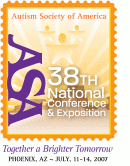 |
The ASA's 38th National Conference on Autism Spectrum Disorders (July 11-14, 2007) of ASAThe Westin Kierland Resort & Spa, Scottsdale, AZ |
| For a complete author index with session numbers, please click here | |
| Thursday, July 12, 2007: 1:15 PM-2:30 PM | |||
| Herberger Ballroom 4 & A | |||
| #2841- JumpStart: A Parent Empowerment & Early Intensive Behaviorally Based Intervention Program* | |||
| The JumpStart program is a parent empowerment program for families of newly diagnosed children with ASD. Throughout JumpStart, we demonstrate how to organize and implement a home-based early intensive behavioral program.
Each session is attended by the family and child with ASD. While the children are in a classroom, the parents participate in a series of topical discussions as well as guided observation of their child’s one on one intervention sessions.
| |||
| Presenter: | - Rachel A. McIntosh, B.A.,BCABA, is the Southwest Autism Research & Resource Centers Hispanic Outreach Coordinator and Director of the JumpStart Program. Ms. McIntosh has over seven years experience working with children with ASD. She currently runs the JumpStart program, in English and in Spanish and is working on replicating the JumpStart program in order to bring JumpStart to other communites. Rachel worked in Los Angeles, for Center for Autism and Related Disorders, CARD, where she worked with toddlers to school age children in home and school. Ms. McIntosh graduated in Psychology from the University of California, Los Angeles. | ||
|
| |||
|
One of SARRC's primary missions is to empower parents (both English and Spanish-speaking) to become knowledgeable and effective in supporting the maturation of their developmentally delayed, at-risk toddlers and young children with autism. One of the programs that supports this mission is the JumpStart Program, which was developed by SARRC in 2002. JumpStart provides five-weeks of early intervention training in both English and Spanish to parents of children with autism up to age 6. Through JumpStart, parents began to learn skills and techniques they can use at home to help increase their child's opportunities for independence. Families are provided support and education on various topics. JumpStart includes eight discussion sessions that cover, What is Autism?, Sleep and Feeding Issues, Understanding Behaviors, Early Intensive Behavioral Intervention, Home Program Management, Picture Exchange Communication System & Visual Supports, Toilet Training, and the Individual Education Plan Process. The discussion group is comprised of six families and one discussion leader. It is our goal to cover relevant information as well as answer individual questions from our families. After the discussion session, the families all move to the Guided Observation Room. Here, parents watch their child as well as two other children in their one on one session with a skilled interventionist. The focus of this portion of the program, is to demonstrate behavioral intervention and what habilitation can look like in the home setting. All sessions are watched via live video feed and recorded. The families receive a copy of their child's DVD that contains all eight one on one sessions. Each child typically receives about 25 minutes of one on one, two times per week. During these sessions they work on three different goals, including a communication activity, an academic activity, and a third activity based on the child's individual needs. The intervention strategies demonstrated are based on the principals of Applied Behavior Analysis and include, Discrete Trial Teaching, Pivotal Response Treatment, and much more. The children attend eight of the ten sessions and participate in the JumpStart Classroom. The JumpStart classroom is comprised of two teachers and six children. The curriculum is very structured, visual supports are used throughout the classroom and skill building and independence related to self help tasks are the main focus. JumpStart was first provided by SARRC in November of 2002 and since that time, SARRC has educated hundreds of parents from all parts of Arizona through the JumpStart Program. Program evaluations have consistently shown that after the program, parents feel more empowered, knowledgeable and effective in supporting the growth and development of their child. National research also demonstrates that children with autism do better when their parents have a positive outlook and are empowered with information.
|
|||
See more of General Submissions
See more of The ASA's 38th National Conference on Autism Spectrum Disorders (July 11-14, 2007)